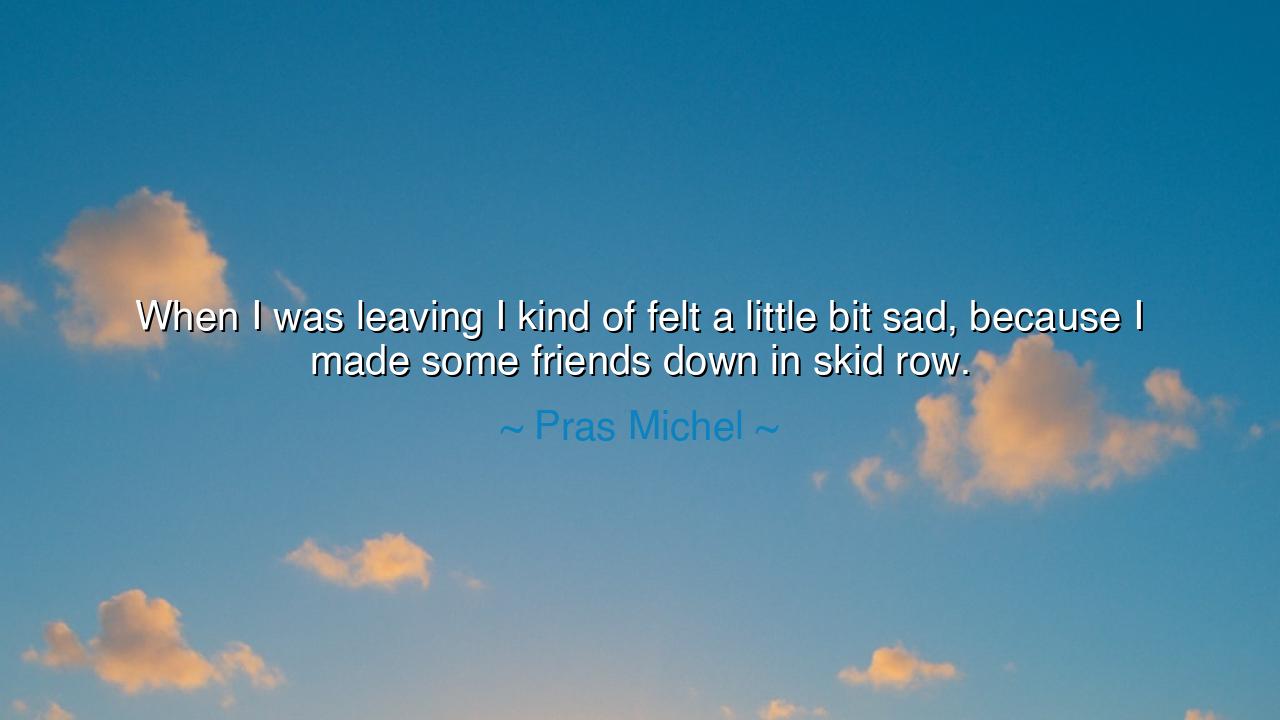
When I was leaving I kind of felt a little bit sad, because I
When I was leaving I kind of felt a little bit sad, because I made some friends down in skid row.






Hear the voice of Pras Michel, who confessed with humility and humanity: “When I was leaving I kind of felt a little bit sad, because I made some friends down in skid row.” These words, born not of poetry but of lived experience, shine a light upon the truth that even in the lowest places, where society casts its forgotten, bonds of friendship and dignity can still flourish. The sadness he names is not merely his own, but the sorrow of witnessing beauty and connection in a place the world so often despises.
The heart of the saying lies in the encounter with skid row—a place synonymous with poverty, homelessness, addiction, and despair. Yet within this landscape, where most pass by with hardened hearts or averted eyes, Michel found not only suffering but also friendship. To say he was sad when leaving reveals that he did not merely visit as an outsider, but entered into human connection. He saw those whom others refuse to see, and in their company discovered the universal truth: even in the dust of hardship, the seeds of fellowship still grow.
This paradox is as old as humanity itself. In ancient times, prophets and sages often walked among the poor and the exiled, finding wisdom where the mighty saw only ruin. Consider St. Francis of Assisi, who abandoned wealth to live among the destitute, and in their simplicity found a joy and freedom richer than gold. Or recall the story of Diogenes the Cynic, who rejected the luxuries of Athens to live with nothing, yet his words shaped generations of philosophers. History reminds us that what the world calls lowly may in fact hold treasures of truth, compassion, and resilience.
Pras Michel’s sadness mirrors the pain of parting from such truths. For once the mask of society is removed, and one looks into the eyes of those on the margins, one can no longer return unchanged. To have friends in skid row is to carry their stories, their laughter, their struggles within one’s heart, even after leaving. The sadness is not only in leaving them behind, but in recognizing the cruel injustice that leaves them there still, unseen and unhelped by the larger world.
This quote also speaks to the leveling power of friendship. In skid row, status and fame are stripped away; there remains only the raw humanity of one person meeting another. For a man of renown to say he felt sadness at leaving is to confess that in that place he found not statistics, not charity cases, but true companions. It is a reminder that friendship is not confined to the halls of power or comfort, but can be forged in the humblest of conditions, where authenticity speaks louder than wealth.
The lesson, then, is plain: do not measure people by the place they stand in, nor by the wealth they carry. Even in the margins of society, even in places shunned or feared, there are hearts capable of deep connection and dignity. To enter such places with openness is to discover humanity’s shared essence—that no man, however broken by circumstance, is beyond the bonds of fellowship.
Practical is this counsel: seek opportunities to see and know those who live outside the comforts of your world. Do not turn away from the homeless, the poor, or the forgotten. Offer not only food or coin, but presence, conversation, and respect. And when you must leave, let the sadness you feel become a fire that drives you to remember them, to advocate for them, and to live in a way that honors the friendships you have found.
So remember the words of Pras Michel: “I felt a little bit sad, because I made some friends down in skid row.” Let them teach you that friendship knows no boundaries, that dignity dwells even in forgotten streets, and that true humanity is discovered when we dare to see one another—not through the lens of wealth or power, but through the eternal eyes of compassion.






AAdministratorAdministrator
Welcome, honored guests. Please leave a comment, we will respond soon